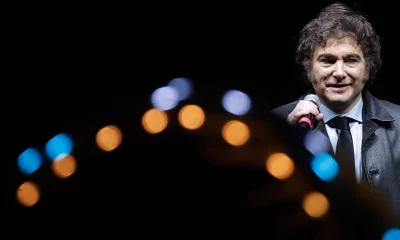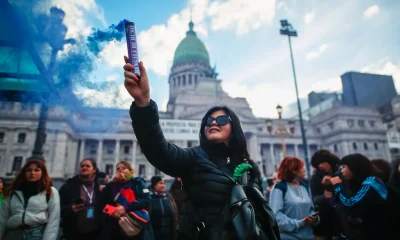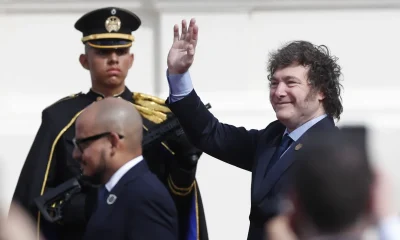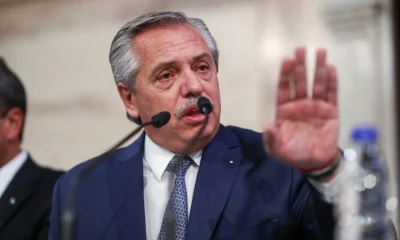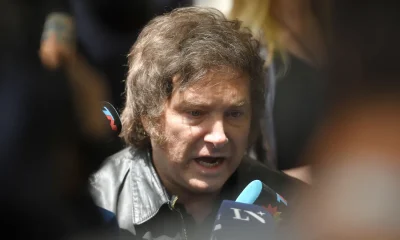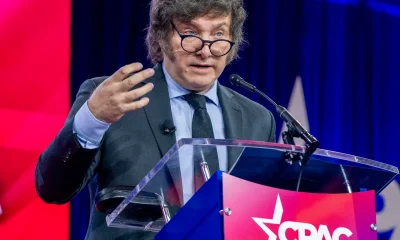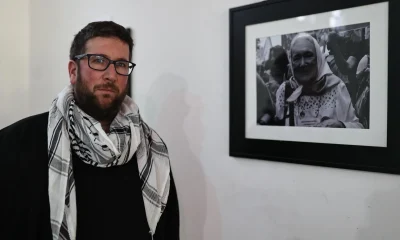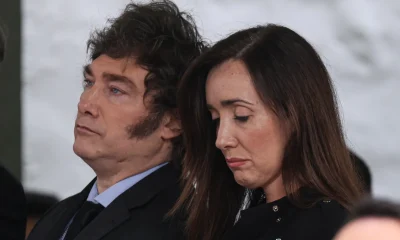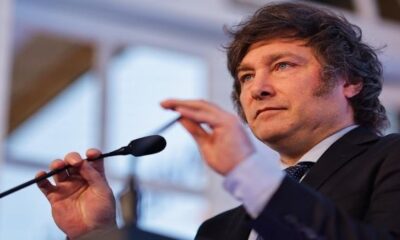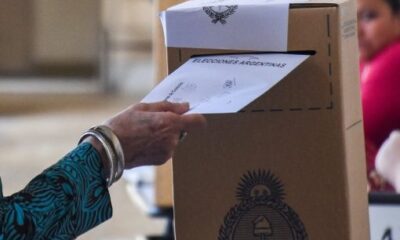International
Argentina’s presidential candidates in final debate
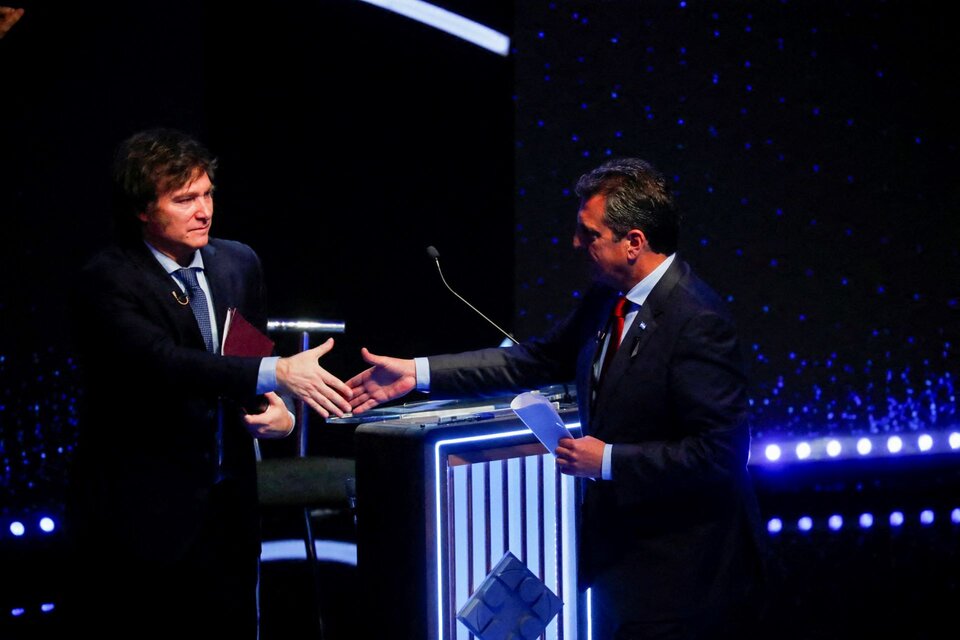
November 13 |
The candidates for the Presidency of Argentina, Sergio Massa (Unión por la Patria) and Javier Milei (La Libertad Avanza) starred on Sunday night in the last and decisive television debate to seek support for the ballot on November 19.
The Law School of the University of Buenos Aires, in the Argentine capital, the same venue as the second debate held before the first round, is the space chosen by the National Electoral Chamber (CNE) for this last appointment.
Throughout the debate both candidates discussed several issues and had a new opportunity to make known their proposals and plans to reach the presidency of the country.
Both Massa and Milei entered into a strong counterpoint, in which the candidate of Unión por la Patria, managed to make the right-winger uncomfortable, who could not face each of the criticisms against him exposed by the candidate of Unión por la Patria (UxP).
The Minister of Economy, Sergio Massa, in his presentation, pointed out that “we have to decide who is going to take care of our health, our education, our work. I am here to propose a great change, with a great agreement of state policies, with dialogue, consensus and respect for those who think differently”.
Milei tried to defend his economic model saying that “Argentina has been in decline for 100 years. This is a consequence of the caste model, which assures that where there is a need there is a right. The problem is that needs are infinite and those rights have to be paid for. This manifests itself in fiscal deficit”.
Massa put Milei on the spot when he confronted him against his campaign and pre-campaign statements: “But there are many things at stake here. We are facing someone who lied during the whole campaign or is lying now”.
According to the Minister of Economy, “Argentina has the responsibility, in an absolutely convulsed world, to think its foreign policy in defense of the Argentine interest, we have to be clear about multipolarity, to have relations with all the countries that open their arms to sell Argentine work. The main partners are Brazil, China, we have to defend that commercial agenda that provides jobs to two million Argentines. This man [Milei] called the most important Argentine in history, Pope Francis, as evil, we are going to work for Francis to come to the country in 2024. And we have to defend the Malvinas cause”, says Massa when talking about Argentina and its relationship with the world.
In the same sense, Massa expresses that Milei said “that Margaret Thatcher was your idol and that the kelpers had the right to self-determination, I ask people to look up what you said”.
Milei tried to answer: “Thatcher was a great leader like Churchill or De Gaulle, she had a great role during the fall of the Berlin Wall, but you are upset that the Wall fell”.
However, Massa closed “Thatcher is an enemy of Argentina”.
The third axis was dedicated to Education and Health. While Milei denies wanting to privatize. Massa answered him in this sense: “Eight points of the GDP will be allocated to education, with 753 kindergartens, with a literacy plan, with compulsory mathematics and robotics, with the preparation of shorter university careers”, Massa listed his proposals.
In the economic block, Sergio Massa pointed out that from the Government “this year we made an effort that allowed us to grow in employment every month” and rejected Javier Milei’s proposal of “opening the economy” that will “destroy thousands of families”.
Massa expressed that “I do not want to go back to that stage in Argentina”, in relation to the indiscriminate opening of imports.
Sergio Massa, said this Sunday that he seeks to “definitively bury the political crack” that exists in the country, while his opponent, the libertarian Javier Milei, asked the population to vote “without fear because it paralyzes”.
At the end of the debate, both candidates were asked by the moderators why they want to preside Argentina.
Massa repeated the idea of forming a “government of unity”, with a program of 10 State policies, and promised to those who will not vote for him out of conviction, “but as a vehicle for not choosing a path that is violence, that is hate, that is damage”, that he will work “so that they do not feel that they threw their vote away”.
On his part, Milei highlighted that this is “the most important election of the last 100 years” because Argentina must ask itself if it wants to continue “walking this decadent path” and “sustain this parasitic, useless and useless caste”; therefore, he asked to “vote without fear because fear paralyzes and benefits the ‘status quo’”.
In view of Javier Milei’s difficulty to answer Sergio Massa’s questions and criticisms, the media could not hide their opinions about the right-winger’s participation in the last debate.
Several media reported that Massa came out victorious by answering with clarity and precision each one of Milei’s opinions, who on more than one occasion tried to make the candidate of Unión por la Patria uncomfortable.
At the end of the last debate for the second round of elections scheduled for November 19, specialized political programs and hegemonic media reported that the candidate of La Libertad Avanza was hesitant and erratic in contrast with Sergio Massa’s answers.
International
U.S. Senate Rejects Budget, Bringing Government Closer to Shutdown Amid DHS Dispute

The U.S. Senate voted on Thursday against a budget proposal in a move aimed at pressuring changes at the Department of Homeland Security (DHS), following the killing of two civilians during a deployment of immigration agents in Minneapolis.
All Senate Democrats and seven Republican lawmakers voted against the bill, which requires 60 votes to advance, pushing the country closer to a partial government shutdown that would cut funding for several agencies, including the Pentagon and the Department of Health.
The rejection came as Senate leaders and the White House continue negotiations on a separate funding package for DHS that would allow reforms to the agency. Proposed measures include banning Immigration and Customs Enforcement (ICE) agents from wearing face coverings and requiring them to use body-worn cameras during operations.
The vote took place just hours after President Donald Trump said he was “close” to reaching an agreement with Democrats and did not believe the federal government would face another shutdown, following last year’s record stoppage.
“I don’t think the Democrats want a shutdown either, so we’ll work in a bipartisan way to avoid it. Hopefully, there will be no government shutdown. We’re working on that right now,” Trump said during a Cabinet meeting at the White House.
International
Trump Says Putin Agreed to One-Week Halt in Attacks on Ukraine Amid Extreme Cold

U.S. President Donald Trump said on Thursday that he secured a commitment from Russian President Vladimir Putinto halt attacks against Ukraine for one week, citing extreme weather conditions affecting the region.
“Because of the extreme cold (…) I personally asked Putin not to attack Kyiv or other cities and towns for a week. And he agreed. He was very pleasant,” Trump said during a Cabinet meeting broadcast by the White House.
Trump acknowledged that several advisers had questioned the decision to make the call.
“A lot of people told me not to waste the call because they wouldn’t agree. And he accepted. And we’re very happy they did, because they don’t need missiles hitting their towns and cities,” the president said.
According to Trump, Ukrainian authorities reacted with surprise to the announcement but welcomed the possibility of a temporary ceasefire.
“It’s extraordinarily cold, record cold (…) They say they’ve never experienced cold like this,” he added.
Ukrainian President Volodymyr Zelensky later commented on the announcement, expressing hope that the agreement would be honored.
International
Storm Kristin Kills Five in Portugal, Leaves Nearly 500,000 Without Power

Storm Kristin, which battered Portugal with heavy rain and strong winds early Wednesday, has left at least five people dead, while nearly half a million residents remained without electricity as of Thursday, according to updated figures from authorities.
The revised death toll was confirmed to AFP by a spokesperson for the National Emergency and Civil Protection Authority (ANPEC). On Wednesday, the agency had reported four fatalities.
Meanwhile, E-Redes, the country’s electricity distribution network operator, said that around 450,000 customers were still without power, particularly in central Portugal.
Emergency services responded to approximately 1,500 incidents between midnight and 8:00 a.m. local time on Wednesday, as the storm caused widespread disruptions.
The Portuguese government described Kristin as an “extreme weather event” that inflicted significant damage across several regions of the country. At the height of the storm, as many as 850,000 households and institutions lost electricity during the early hours of Wednesday.
Several municipalities ordered the closure of schools, many of which remained shut on Thursday due to ongoing adverse conditions.
Ricardo Costa, regional deputy commander of the Leiria Fire Brigade, said residents continue to seek assistance as rainfall persists.
“Even though the rain is not extremely intense, it is causing extensive damage to homes,” he noted.
In Figueira da Foz, a coastal city in central Portugal, strong winds toppled a giant Ferris wheel, underscoring the severity of the storm.
-

 Central America4 days ago
Central America4 days agoGuatemala Police Arrest Prison Guard Caught in the Act of Extortion
-

 Central America4 days ago
Central America4 days agoHonduras swears in conservative president Asfura after disputed election
-

 Central America4 days ago
Central America4 days agoBukele leads public trust rankings as UCA survey highlights gains in security
-

 International3 days ago
International3 days agoFootball Fan Killed in Clashes After Colombian League Match
-

 International4 days ago
International4 days agoDoomsday clock moves to 85 seconds before midnight amid rising global risks
-

 Central America3 days ago
Central America3 days agoGuatemala President Says Starlink Terminal Found Inside Prison
-

 International2 days ago
International2 days agoU.S. Senate Rejects Budget, Bringing Government Closer to Shutdown Amid DHS Dispute
-

 International4 days ago
International4 days agoWinter Storm Fern Leaves 30 Dead and Over One Million Without Power Across the U.S.
-

 Sin categoría4 days ago
Sin categoría4 days agoEight Killed in Series of Armed Attacks in Ecuador’s Manabí Province
-

 International4 days ago
International4 days agoSpain approves plan to regularize up to 500,000 migrants in Historic Shift
-

 International3 days ago
International3 days agoMissing Spanish Sailor Rescued After 11 Days Adrift in Mediterranean
-

 International3 days ago
International3 days agoRubio Says U.S. Could Participate in Follow-Up Russia-Ukraine Talks
-

 Sin categoría4 days ago
Sin categoría4 days agoEl Salvador Launches Fourth Year of Ocean Mission to Protect Marine Ecosystems
-

 Central America1 day ago
Central America1 day agoPanama Supreme Court Strikes Down Panama Ports Concession as Unconstitutional
-

 International2 days ago
International2 days agoStorm Kristin Kills Five in Portugal, Leaves Nearly 500,000 Without Power
-

 Central America1 day ago
Central America1 day agoU.S. and Guatemala Sign Trade Deal Granting Zero Tariffs to Most Exports
-

 International2 days ago
International2 days agoMan Arrested After Vehicle Crashes Into Jewish Institution in Brooklyn
-

 International2 days ago
International2 days agoTrump Says Putin Agreed to One-Week Halt in Attacks on Ukraine Amid Extreme Cold





























